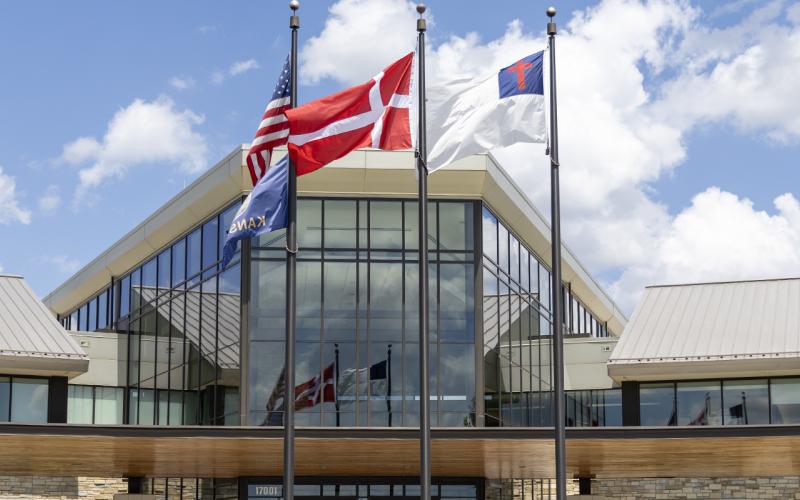
Q&A: JESUS Film leader reflects on ministry's 20th anniversary

JESUS Film Harvest Partners (JFHP) is a Kingdom-building ministry devoted to world evangelism through the JESUS film and other tools used by teams of local people for evangelism, discipleship, and church planting.
The ministry is celebrating its 20th anniversary this year. JFHP Executive Director Brian* reflects on what God has done across the past two decades and looks ahead at what is to come.
Interviewer: Brian, you have been with JFHP since the beginning. Could you take some time to tell us about your history with the organization?
Brian: My history started when a group of lay people who were working for Campus Crusade for Christ’s Jesus Film Project ministry came to the Church of the Nazarene because they were Nazarenes and asked is there a way we can work together? Since I had media background, I was asked to give leadership to this ministry. From the beginning, we’ve been trying to put media in the hands of local people all around the world so they can reach their neighbors in a more efficient manner.
Interviewer: With such a long history, I am sure there have been many ways you have seen God work in your life. How do you feel God has transformed you as a leader over these 20 years?
Brian: Twenty-year transformations are probably hard to describe because they take place minute by minute. The big thing that I’ve discovered about myself is I can’t quit. The Great Commission is such that there is no quitting. We were given a commission and a command to go — to reach areas and people groups that we’ve never reached in 2,000 years.
A couple other things I’ve found out about myself is I need to be patient with the process but also directive with the goals. If I can give direction and I can help equip the saints for service all around the world, then I’m fulfilled. But that direction needs to be goal-oriented and based on the vision. That takes patience when we’re working with various cultures — some of them blow up in our face because of changes in government or famine, drought, pestilence. But whatever the changes are out there, the people are still there and they need Jesus Christ.
Interviewer: Looking back over these 20 years, what has surprised you about how God has developed JFHP?
Brian: JFHP began with a vision to help Campus Crusade for Christ’s Jesus Film Project — to help everybody in the world have a chance to see JESUS. When they came to us, they had the JESUS film in approximately 600 languages. Their goal was that everybody in the world gets a chance to see JESUS in a language they can understand, within walking distance of their home, by the end of the year 2000. As we started to receive more languages from them, our focus changed.
After the year 2000, we decided to focus on church planting. We hadn’t been focused on the church planting and discipleship as much as the coverage of getting the next person to have one chance to see JESUS. When we changed to creating fruit that lasts, it totally changed our perspective on how we do what we do.
Interviewer: You mentioned a couple of changes to the initial strategy; how else has the strategy changed over the years?
Brian: Technology has been great. We started with 16-millimeter equipment, and back then just the film print itself was 19 pounds and it cost about $2,500 each. We went to VHS videotapes when video projectors dropped in value…then we could add more languages to the equipment sets of the teams. Then when we went from VHS videos to DVDs, we could actually lighten their load. A DVD is less bulky and we could put more languages in their set. Campus Crusade kept giving us new languages, and so finally when we went to digital technology or flash memory…then we could add as many languages as we wanted. So everything got smaller and cheaper; some of the stuff got lighter in weight and the audio increased in quality.
There have been some course corrections over the years we have had to consider. When we found ourselves going into some countries where the leadership changed or the democracy changed, maybe a dictator took over, we had to change how we did what we did in that country.
Quite recently a couple of countries have passed anti-conversion laws. Rather than being able to show showings outside, publicly, and leading people to Christ in public, we’ve had to go indoors. Some of these laws have even said you cannot do Christian ministry outside the walls of a church — in a couple countries that’s been the case. We find ourselves adjusting to the political climate sometimes in a country or what the leadership dictates is the new climate or the religions in certain countries have been resistant to sharing Jesus like we do. So we’ve had to adjust and expand our ministry in a different way at certain times.
Interviewer: In addition to the Nazarene denomination and CRU (formerly Campus Crusade for Christ), JFHP has partnered with many other organizations and ministries. What are some of those partnerships, and what is the key to working with so many partners to make an effective ministry?
Brian: The key is always a triple win. It always needs to be a win for us, JFHP; it needs to be a win for the partnering organization, so we need to help them succeed in their mission statement and their goals; and then it needs to be a win for the field. We always want the end result — what happens at the local level — to be a win for those people. So we don’t show up and try to tell them how to do what they’re doing; we just come alongside and ask them, “Hey, what could you use next? How can we make things better for you so that you can reach your neighbors — maybe neighbors that you’ve been living beside for 2,000 years? How can we help you reach those neighbors with the gospel of Jesus Christ?”
e3 Partners…put the EvangeCube and Evangeball (eBall) in our hands. Those are evangelistic tools but they are also discipleship tools, so it gave us a ball that we could throw out in the field before the JESUS film showing and that would attract the kids. The kids would come around and start playing soccer...and then we’d gather them together and say, “Hey, have you ever seen a ball like this?” [They’d say,] “No. I don’t know what the colors mean.” “Well, let me tell you!” And then we lead them through a plan of salvation. Sometimes we use the EvangeCube to do that, and then we invite them to see a movie in their language about what we just showed them with the tools. Then they invite their friends and their family to come with them that night to view the showing. After the film, we use those tools as well and disciple people.
Since then, Faith Comes by Hearing has given us audio Bibles, the Wesleyan Publishing House allows us to use their Bible story pictures which we created into a Bible Story Cloth. Several other tools have been created because of partnerships — because we decided to work together. And guess what? We found out that if we work together, we can do more together than we could separately.
Interviewer: JFHP has long existed as an extension ministry of the Church of the Nazarene. How do you feel that relationship has changed or impacted the denomination globally?
Brian: Globally it was like putting rocket boosters on our mission movement. We can’t claim or track a lot of the growth because what we do in evangelism we also reach out in compassion, education, and some other ways — through youth ministry, Sunday School. So when we inserted JESUS Film teams into what we already did, it gave local people in different countries the capacity to impact a local village more rapidly. They could show up, set up the equipment, and in three hours reap the harvest that the Holy Spirit has prepared.
There is a story I’d like to share with you. It came from one of our leaders in Ecuador. He said that when we were just doing evangelism like normal, they might win one or two in a church a year, and it was like fishing with a fishing pole. When we added the concept of “each one win one,” so each person win a person every year, each pastor train a pastor every year, and each church start a church every year, he said that was like fishing with a fishing net — we were able to gather more people in because more people and churches were mobilized and organized. Their vision was to get the next lost person and share Jesus with them. When we added JFHP to that equation, he said it was like fishing with dynamite. When you go fishing with dynamite, you throw dynamite into the pond or river and it makes all the fish come up to the top of the water and you just scoop them up. So he said, exponentially, JFHP has given us the capacity to expand what we do and how we do it.
*Last name omitted for security purposes.
